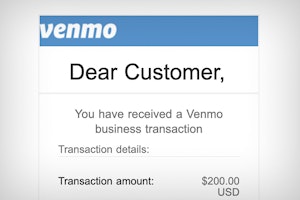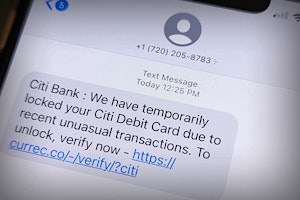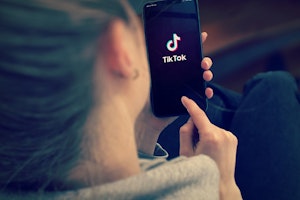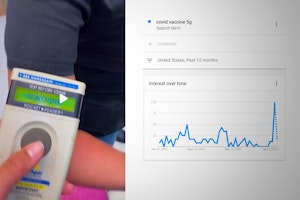Entertainment In Depth
- What is the Entertainment Industry?
- Entertainment Industry by the Numbers
- The Growth of Streaming Services
- Online Gaming's Billion Dollar Industry
- In-Person Events & Concerts
- How to Report Entertainment Scams
If you've ever binged an entire series in a day, purchased front row seats to watch your favorite team beat their opponents, or sang your heart out at a music festival, you're one of the millions of people who've made the entertainment industry the powerhouse that it is today.
As technology continues to advance and the internet can be accessed from virtually anywhere at any time, this dynamic industry isn't slowing down any time soon.
What is the Entertainment Industry?
The entertainment industry’s origins can be traced back to the early 1800s, a time when theater was the star of the show and actors traveled from town to town to showcase their craft.
Today, the media and entertainment industry is a $2 trillion sect globally, with the U.S. making up a third of the entire industry. The medium encompasses everything from newspapers to magazines, TV, radio and other popular forms of entertainment such as books, film, music, and social media.
And with the invention of the internet and advances in technology, people have more ways than ever before to interact with their favorite forms of entertainment.
Entertainment Industry by the Numbers
In 2021, the Motion Picture Association (MPA) released their annual THEME report which included the following stats:
- In 2021 the entertainment market (home and mobile) totaled $36.8 billion in the U.S.
- The 14% year-over-year (YOY) increase from 2020 to 2021 surpassed the record $36.1 billion in 2019
- Digital entertainment accounted for 80% of all dollars at $29.5 billion
- Since 2014, digital has nearly doubled from $7.6 billion and has become the fastest growing sector
- There were 135 streaming providers in the U.S. in 2021
- Streaming movies grew by 15% in 2021
- TV shows grew by 5%
- The pay TV subscription market and cable, generated $49.0 billion in 2021
- There were 353.2 million total video subscriptions last year which was a 14% YOY
- Netflix is still the king of the streaming world and featured 9 of the 10 most-streamed original series
- Disney+ tops the list for the most streamed movies in 2021
- In the U.S., there were 559 original scripted television shows across multiple platforms (broadcast, pay TV, online)
- Daily time spent viewing TV (live/recorded) was 3 hours and 16 minutes among adults in the U.S. last year
- Daily time spent viewing video on other devices (smart TV apps) in 2021 averaged 1 hour and 11 minutes
The Growth of Streaming Services
With the growth of digital technologies and the internet, content can now be consumed in greater capacities via a variety of platforms. Though traditional TV viewership has declined, streaming services such as Netflix, Hulu, and Disney+ have quickly grown to become the most popular ways entertainment is consumed.
The top streaming services by subscribers in 2022:
- Netflix
- Disney+
- Hulu
- Sling
- Peacock
- FuboTV
- Amazon Prime
- Apple TV
In total, 250 million Americans are paying for subscriptions of these services, with the average household subscribing to an average of 3.1 streaming services.
What to Know About TV Streaming Services
With their rise in popularity, it’s no surprise that scammers have found ways to use streaming services to steal login information and other personal data while posing as a streaming service provider.
Common Tactics Used by Scammers
- Sending fake discounted or free subscription offers
- Notifying you of issues with your login credentials
- Alerting you that you need to update your payment info in order to continue watching your shows
While these services often do send email correspondence, you should always take precaution before replying or interacting with any messages that seem suspicious.

Here are some ways to protect yourself from streaming service scams:
- Always make sure you’re clicking on the provider’s official website. Scammers can easily mimic a legitimate website in search engine results, but the easiest giveaway to spot will be within the URL itself. Check to make sure the company name is spelled correctly before opening any website.
- Check the sender’s address in email correspondence. Although the text may say “Hulu” or “Netflix,” if the domain name is something like “@netflix_123.com,” it’s likely a fraudulent account.
- Consider what is being requested within the email, phone, or text. Streaming services will never ask you via email, phone, or text to provide personal or financially sensitive information.
- Look for spelling and grammatical errors within the email, text message, or webpage. These are all signs of a scam.
- Check the logo and design for any inconsistencies with branding, such as strange colors that don’t match the brand’s aesthetic, or a blurry logo, or it is likely a scam website or message.
Online Gaming's Billion Dollar Industry
Globally, the online gaming industry is expected grow from $73.42 billion in 2021 to $81.08 billion this year. This is likely due to the easy accessibility of the internet and the adoption of smartphones, with mobile users accounting for about 80% of all users in the online gambling industry.
It’s projected that there will be more than 150 million monthly mobile gamers in the U.S. this year, with mobile gaming being particularly popular among younger individuals including children and teens.
According to Sensor Tower’s December 2021 data, annual mobile game app store revenues increased to $37.3 billion and $52.3 billion on Android and iOS, respectively. With the internet at our fingertips daily, it’s important to understand the dangers of online gaming in order to protect children and younger adults.
Staying Safe While Online Gaming
There are a few things you can do to help keep your children and teens safe online. This includes:
- Educate children and teens on how to play their games safely (e.g., refraining from sharing any personal information with other players, understanding that not all online players are who they say they are)
- Enable restrictions and parental controls on your phone and game and on your device
- Report inappropriate content and players
It’s also a good idea to keep an eye on your credit card statements since children can sometimes mistakenly make purchases online or can be tricked by scammers trying to get money from them.
In-Person Events & Concerts
Another major contributor to the entertainment industry are events which includes music concerts, festivals, sports, exhibitions, conferences, and corporate events and seminars. In the U.S., the events industry made $255.31 billion in 2021.
Though the ongoing global pandemic, which began in the U.S. in 2020, halted large gatherings and disrupted the music industry, concerts and events have come back stronger than ever.
As patrons return to music venues, large-scale conferences, and shell out the big bucks to see their favorite sports teams, it’s important to be aware of the scams that are out there surrounding ticket purchases.
Buying tickets via sites like Craigslist and Facebook may be helpful in securing a cheap ticket, but it also leaves you vulnerable to buying a fake ticket that will leave you empty handed.
How to Safely Purchase Concert & Events Tickets
Fake ticket scams have been around for years, but scammers are getting more and more advanced when it comes to tricking potential victims.
Though it can be hard to tell whether online tickets are legitimate or fake before you buy them, there are a few telltale signs to be on the lookout for when shopping around.
Red flags of fake tickets include:
- Typos and grammatical errors in the listing or on the actual ticket
- Requests to pay by bank transfer
- Requests to pay by gift card
- Tickets being available on third-party sites for sold-out events
- Prices are higher than the face value of actual tickets
- Pushy sellers rushing you to make a purchase
- Sellers refusing to show you the actual ticket
- Websites without a customer service number or physical address

There are also few ways to add an extra layer of protection when purchasing tickets. This includes:
- Only purchasing tickets only from trusted vendors
- Only using on secure websites (they should start with “https://”)
- Using a credit card that offers fraud protection when buying tickets
- Inspecting the ticket before you buy it (if possible)
How to Report Entertainment Scams
If you believe you’re the victim of an entertainment scam, you have some options. The best thing to do is report the incident to a few different parties. To do so, you can report it to:
- The Federal Trade Commission (FTC)
- The FBI’s Internet Crime Complaint Center (IC3)
- The website or social media site you used to purchase your tickets
- Your local police
You may also want to alert your credit card company in case they have fraud protections in place. Let them know what happened and have any evidence of the transaction available for their records. They may be able to get you your money back.
Scams Relating to Entertainment

Netflix Text Message Saying Your Payment is Declined is Fake
Scammers are sending text messages claiming to be from Netflix and saying your subscription has been put on hold. Here's how to tell the texts are fake and what to do about it.

Free Netflix for a Year: Don't Believe the Hype, It's a Scam
Netflix has never offered a free subscription for an entire year. If you receive this offer from "Netflix," it's a scam.

Dangerous Netflix Scam Emails: How to Identify & Beat These 'Netflix Suspension' Scams
That Netflix email may seem genuine, but be sure to look for any red flags of a scam so you don't fall victim to identity theft.

Selling on Facebook Marketplace? Beware of Fake Venmo Emails
Scammers are sending fake Venmo emails to Facebook Marketplace sellers in an attempt to steal login information and money.

Citibank Text Message Scam: Locked Debit Card Alert Is Fake
If you've received a locked debit card text message from Citibank, it's likely a scam. Don't click on the link and delete the text message.

Real Chase Fraud Text Alert or Scam Message?
If you receive a text message from Chase Bank, don't click on any links or call the phone number listed—it could be a scam designed to steal your information and money.

Amex Fraud Text Alert Scams: Spotting a Fraud
If you receive a text message from American Express, don't click on any links or call the phone number listed—it could be a scam designed to steal your information and money.

Fake Verizon Text Messages: How to Avoid a Scam
Verizon may send you text messages from time to time with account updates or data usage alerts, but beware—most of these aren't really from Verizon but scammers.

Get an Unexpected Delivery Alert? It May be a UPS Text Scam
Scammers are using SMS messages to send fake alerts to customers regarding a package delivery. Here's what to know about this scam.

Venmo Text Scam: Don't Fall For These Fake Messages
If you received a text from Venmo with a link to verify a payment or deposit, or are asked to complete a survey in exchange for money, it may be a scam.
Guides Relating to Entertainment

Cost of Streaming Services in 2022 (And How It's Changed Over the Years)
With the recent Netflix price hike on all of its plans, what can we expect for the other streaming services this year? We take a look at how the cost of streaming services has changed over the years.

How to Beat Netflix Scams and Binge Watch in Safety
With more than 200 millions subscribers worldwide, it's no wonder scammers target Netflix customers, attempting to hack accounts and steal information.

How to Get Verified on TikTok
Securing that little blue checkmark can mean brand collabs, sponsorship opportunities, or protecting your unique content from impersonators.

How to Tell if Nikes Are Fakes: From Tags to the Stitching
Nike is one of the biggest brands targeted by counterfeiters and scammers - be extra careful with Nike products from non-official retailers as you could end up with a fake

Funeral Homes & Prices - What Are The Costs & Your Rights?
Average prices from funeral homes range between $8k to $14k and consumers are meant to be protected by a 'Funeral Rule' - what are your consumer rights?
News Relating to Entertainment

Urgent CDC Warning: Eye Drops Linked to 3 Deaths, Loss of Vision
The CDC is warning eye drops users of a rare bacterial infection from 2 brands of eye drops. The infection is resistant to antibiotics and has resulted in the loss of vision, loss of eyeballs and the death of 3 patients.

Banks May Refund More Zelle Scam Victims in 2023
Zelle scams have reached a serious volume. New reports suggest that banks are looking at new refund protections for customers in 2023.

Optus Data Breach - One of the Worst Cyberattacks in Australia
Hackers have gained access to 9.8 million customer records from Optus in Australia, exposing personal information such as driver licence, medicare and passport details.

Roe vs. Wade Overturned: Abortion Rights in Your State
Find out what the overturning of Roe vs. Wade means for abortion rights in your state.

Searches for "COVID Vaccine 5G" Hit All-Time High, But Microchips Definitely Not in Vaccine
The number of people searching for the term "COVID vaccine 5G" on Google has just hit an all-time high, but there's one way to be sure that there are no microchips.




